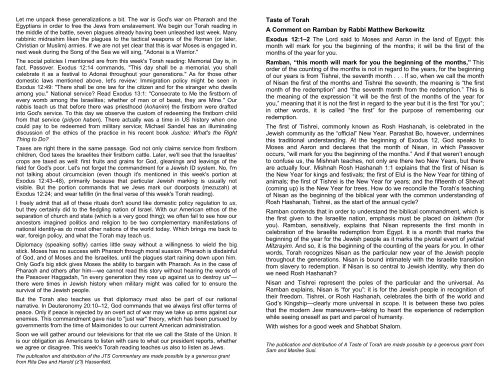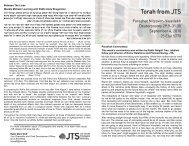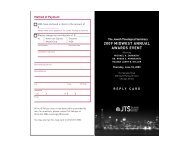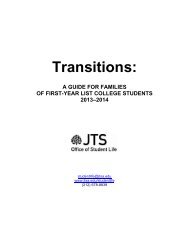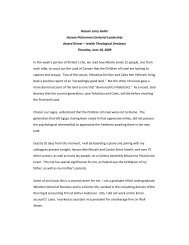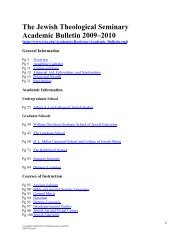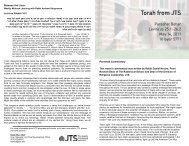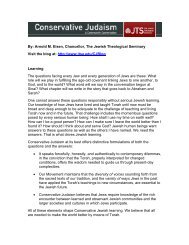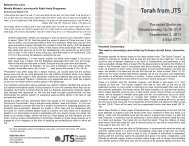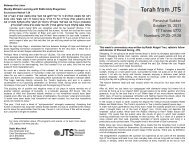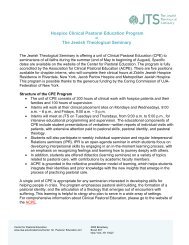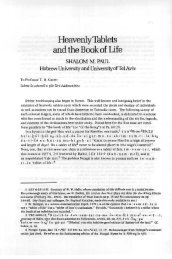Torah from JTS Bo 5770
Torah from JTS Bo 5770
Torah from JTS Bo 5770
You also want an ePaper? Increase the reach of your titles
YUMPU automatically turns print PDFs into web optimized ePapers that Google loves.
Let me unpack these generalizations a bit. The war is God's war on Pharaoh and the<br />
Egyptians in order to free the Jews <strong>from</strong> enslavement. We begin our <strong>Torah</strong> reading in<br />
the middle of the battle, seven plagues already having been unleashed last week. Many<br />
rabbinic midrashim liken the plagues to the tactical weapons of the Roman (or later,<br />
Christian or Muslim) armies. If we are not yet clear that this is war Moses is engaged in,<br />
next week during the Song of the Sea we will sing, "Adonai is a Warrior."<br />
The social policies I mentioned are <strong>from</strong> this week's <strong>Torah</strong> reading: Memorial Day is, in<br />
fact, Passover. Exodus 12:14 commands, "This day shall be a memorial, you shall<br />
celebrate it as a festival to Adonai throughout your generations." As for those other<br />
domestic laws mentioned above, let's review: Immigration policy might be seen in<br />
Exodus 12:49: "There shall be one law for the citizen and for the stranger who dwells<br />
among you." National service? Read Exodus 13:1: "Consecrate to Me the firstborn of<br />
every womb among the Israelites; whether of man or of beast, they are Mine." Our<br />
rabbis teach us that before there was priesthood (kohanim) the firstborn were drafted<br />
into God's service. To this day we observe the custom of redeeming the firstborn child<br />
<strong>from</strong> that service (pidyon haben). There actually was a time in US history when one<br />
could pay to be redeemed <strong>from</strong> military service; Michael Sandel has an illuminating<br />
discussion of the ethics of the practice in his recent book Justice: What's the Right<br />
Thing to Do?<br />
Taxes are right there in the same passage. God not only claims service <strong>from</strong> firstborn<br />
children, God taxes the Israelites their firstborn cattle. Later, we'll see that the Israelites'<br />
crops are taxed as well: first fruits and grains for God, gleanings and leavings of the<br />
field for God's poor. Let's not forget the commandment for a Jewish ID system. No, I'm<br />
not talking about circumcision (even though it's mentioned in this week's portion at<br />
Exodus 12:43–48), primarily because that particular Jewish marking is usually not<br />
visible. But the portion commands that we Jews mark our doorposts (mezuzah) at<br />
Exodus 12:24; and wear tefillin (in the final verse of this week's <strong>Torah</strong> reading).<br />
I freely admit that all of these rituals don't sound like domestic policy regulation to us,<br />
but they certainly did to the fledgling nation of Israel. With our American ethos of the<br />
separation of church and state (which is a very good thing); we often fail to see how our<br />
ancestors imagined politics and religion to be two complementary manifestations of<br />
national identity-as do most other nations of the world today. Which brings me back to<br />
war, foreign policy, and what the <strong>Torah</strong> may teach us.<br />
Diplomacy (speaking softly) carries little sway without a willingness to wield the big<br />
stick. Moses has no success with Pharaoh through moral suasion. Pharaoh is disdainful<br />
of God, and of Moses and the Israelites, until the plagues start raining down upon him.<br />
Only God's big stick gives Moses the ability to bargain with Pharaoh. As in the case of<br />
Pharaoh and others after him—we cannot read this story without hearing the words of<br />
the Passover Haggadah, "in every generation they rose up against us to destroy us"—<br />
there were times in Jewish history when military might was called for to ensure the<br />
survival of the Jewish people.<br />
But the <strong>Torah</strong> also teaches us that diplomacy must also be part of our national<br />
narrative. In Deuteronomy 20:10–12, God commands that we always first offer terms of<br />
peace. Only if peace is rejected by an overt act of war may we take up arms against our<br />
enemies. This commandment gave rise to "just war" theory, which has been pursued by<br />
governments <strong>from</strong> the time of Maimonides to our current American administration.<br />
Soon we will gather around our televisions for that rite we call the State of the Union. It<br />
is our obligation as Americans to listen with care to what our president reports, whether<br />
we agree or disagree. This week's <strong>Torah</strong> reading teaches us also to listen as Jews.<br />
The publication and distribution of the <strong>JTS</strong> Commentary are made possible by a generous grant<br />
<strong>from</strong> Rita Dee and Harold (z”l) Hassenfeld.<br />
Taste of <strong>Torah</strong><br />
A Comment on Ramban by Rabbi Matthew Berkowitz<br />
Exodus 12:1–2 The Lord said to Moses and Aaron in the land of Egypt: this<br />
month will mark for you the beginning of the months; it will be the first of the<br />
months of the year for you.<br />
Ramban, “this month will mark for you the beginning of the months,” This<br />
order of the counting of the months is not in regard to the years, for the beginning<br />
of our years is <strong>from</strong> Tishrei, the seventh month . . . If so, when we call the month<br />
of Nisan the first of the months and Tishrei the seventh, the meaning is “the first<br />
month of the redemption” and “the seventh month <strong>from</strong> the redemption.” This is<br />
the meaning of the expression “it will be the first of the months of the year for<br />
you,” meaning that it is not the first in regard to the year but it is the first “for you”;<br />
in other words, it is called “the first” for the purpose of remembering our<br />
redemption.<br />
The first of Tishrei, commonly known as Rosh Hashanah, is celebrated in the<br />
Jewish community as the “official” New Year. Parashat <strong>Bo</strong>, however, undermines<br />
this traditional understanding. At the beginning of Exodus 12, God speaks to<br />
Moses and Aaron and declares that the month of Nisan, in which Passover<br />
occurs, “will mark for you the beginning of the months.” And if that weren’t enough<br />
to confuse us, the Mishnah teaches, not only are there two New Years, but there<br />
are actually four. Mishnah Rosh Hashanah 1:1 explains that the first of Nisan is<br />
the New Year for kings and festivals; the first of Elul is the New Year for tithing of<br />
animals; the first of Tishrei is the New Year for years; and the fifteenth of Shevat<br />
(coming up) is the New Year for trees. How do we reconcile the <strong>Torah</strong>’s teaching<br />
of Nisan as the beginning of the biblical year with the common understanding of<br />
Rosh Hashanah, Tishrei, as the start of the annual cycle?<br />
Ramban contends that in order to understand the biblical commandment, which is<br />
the first given to the Israelite nation, emphasis must be placed on lakhem (for<br />
you). Ramban, sensitively, explains that Nisan represents the first month in<br />
celebration of the Israelite redemption <strong>from</strong> Egypt. It is a month that marks the<br />
beginning of the year for the Jewish people as it marks the pivotal event of yetziat<br />
Mitzrayim. And so, it is the beginning of the counting of the years for you. In other<br />
words, <strong>Torah</strong> recognizes Nisan as the particular new year of the Jewish people<br />
throughout the generations. Nisan is bound intimately with the Israelite transition<br />
<strong>from</strong> slavery to redemption. If Nisan is so central to Jewish identity, why then do<br />
we need Rosh Hashanah?<br />
Nisan and Tishrei represent the poles of the particular and the universal. As<br />
Ramban explains, Nisan is “for you”: it is for the Jewish people in recognition of<br />
their freedom. Tishrei, or Rosh Hashanah, celebrates the birth of the world and<br />
God’s Kingship—clearly more universal in scope. It is between these two poles<br />
that the modern Jew maneuvers—taking to heart the experience of redemption<br />
while seeing oneself as part and parcel of humanity.<br />
With wishes for a good week and Shabbat Shalom.<br />
The publication and distribution of A Taste of <strong>Torah</strong> are made possible by a generous grant <strong>from</strong><br />
Sam and Marilee Susi.


